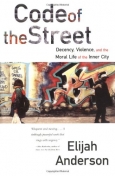BKMT READING GUIDES
Code of the Street: Decency, Violence, and the Moral Life of the Inner City
by Elijah Anderson
Paperback : 352 pages
1 club reading this now
0 members have read this book
Unsparing and important. . . . An informative, clearheaded and sobering book.?Jonathan Yardley, Washington Post (1999 Critic's Choice)
Inner-city black America is often stereotyped as a place of random violence; in fact, violence in ...Introduction
Unsparing and important. . . . An informative, clearheaded and sobering book.?Jonathan Yardley, Washington Post (1999 Critic's Choice)
Inner-city black America is often stereotyped as a place of random violence; in fact, violence in the inner city is regulated through an informal but well-known code of the street. How you dress, talk, and behave can have life-or-death consequences, with young people particularly at risk. The most powerful force counteracting this code and its reign of terror is the strong, loving, decent family, and we meet many heroic figures in the course of this narrative. Unfortunately, the culture of the street thrives and often defeats decency because it controls public spaces, so that individuals with higher, better aspirations are often entangled in the code and its self-destructive behaviors. Writing in the tradition of Jane Jacobs and William Julius Wilson, the author delineates the true workings of city streets. His most interesting characters are not the bullies and dealers, but the decent folks, young and old, who through entrepreneurship and creative self-help strategies are forging a viable alternative, an escape from the code of the street. Winner of the Komarovsky Book Award, this incisive book examines the code as a response to the lack of jobs that pay a living wage, to the stigma of race, to rampant drug use, to alienation and lack of hope. An individual's safety and sense of worth are determined by the respect he commands in public?a deference frequently based on an implied threat of violence. Unfortunately, even those with higher aspirations can often become entangled in the code's self-destructive behaviors.As sociologist Elijah Anderson shows in the detailed and devastating Code of the Street, the senseless crime in the inner city represents a complex, though ultimately self-defeating, set of social mores. These mores, called "codes," stress a hyperinflated sense of manhood through verbal boasts, drug selling, sexual prowess, and--ultimately--violence and death. "At the heart of the code is the issue of respect," Anderson writes, "loosely defined as being treated 'right' or being granted one's 'props' (or proper due) or the deference one deserves." Anderson reveals a world where unemployment is rampant, teenage pregnancy is common, and social and educational achievement is viewed as "acting white." Although Anderson states that racism is a major factor for this condition, he notes that this type of behavior is further exacerbated by modern economic and political forces, and that it has existed as far back as ancient Rome.
As an African American himself, Anderson moves through the middle- and lower-class Philadelphia neighborhoods with ease, interviewing a variety of subjects, all of whom deal daily with consequences of urban decay--from the high-achieving young woman who had to reject her poorer relatives to better herself, to the former delinquent who tries to go straight after returning from prison. For Anderson, these are the true heroes of Code of the Street: people who overcome the temptations of the streets to help create a better space for the next generation. --Eugene Holley Jr.
Discussion Questions
No discussion questions at this time.Book Club Recommendations
Recommended to book clubs by 0 of 0 members.
Book Club HQ to over 90,000+ book clubs and ready to welcome yours.
Get free weekly updates on top club picks, book giveaways, author events and more








